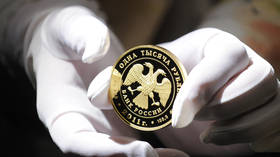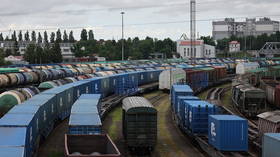Original link to this article can be found here:
https://www.rt.com/business/557611-russia-golden-ruble-sanctions/

Russia needs a new mechanism for international settlements to be able to operate under Western sanctions, a report by the country’s development corporation VEB.RF says.
According to the report, the introduction of financial sanctions against Russia, which, despite state measures, results in economic losses for the country, also indicates that a transition to a completely different national financial and monetary system is in order.
VEB.RF analysts suggest that Russia should create a gold-backed stablecoin under the working title ‘golden ruble’. According to their research, Western countries will have no opportunity to block operations carried out in such a currency, since its exchange rate will be pegged to the gold rate on the world market, not to the dollar, the euro or, for that matter, the fiat ruble itself. Gold backing would ensure the currency’s immunity to sanctions, and the ‘golden ruble’ could be used freely in external transactions, including those between third countries without the participation of Russia.
Analysts have also proposed launching a mechanism for working with cryptocurrencies for sanctioned companies on crypto exchanges in friendly states, or the creation of a national crypto exchange to facilitate ‘golden ruble’ trading.
VEB.RF suggests that the Bank of Russia should develop a system of international settlements with friendly countries in their national digital currencies based on distributed ledger technologies, and introduce a hedging system for eliminating currency risks.
Besides diving into the digital currency world, analysts say Russia’s new financial system could incorporate large-scale use of barter schemes and new offshore zones, especially with China. Further on, they suggest creating a blockchain unit within the BRICS framework, which would mirror the IMF special drawing rights system, albeit in digital form.
The VEB.RF report also draws attention to Russia’s MIR payment system (a Visa and Mastercard analogue) and SWIFT-like SPFS interbank messaging mechanism, and suggests that they should be expanded outside of Russia, at least within the CIS bloc and China.



